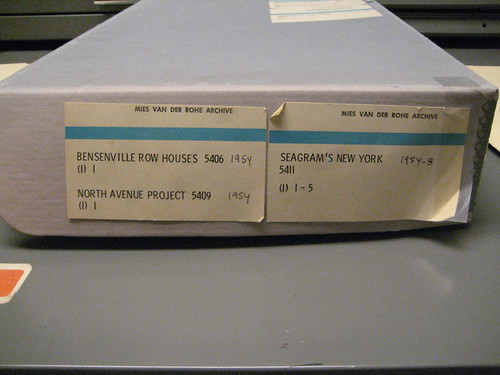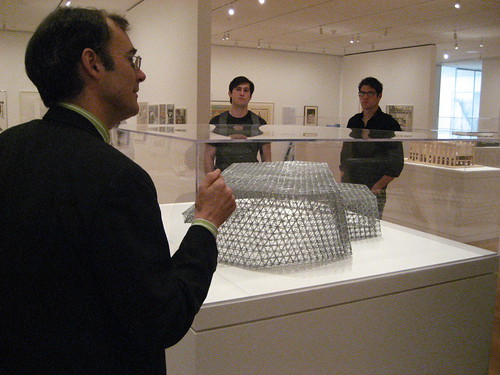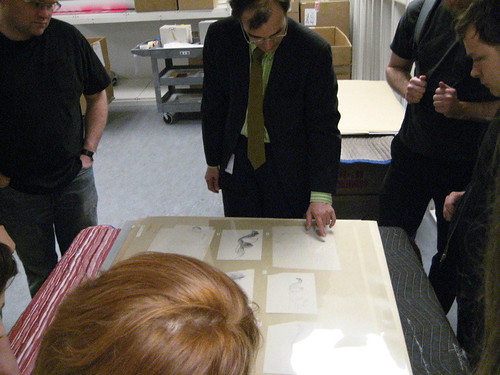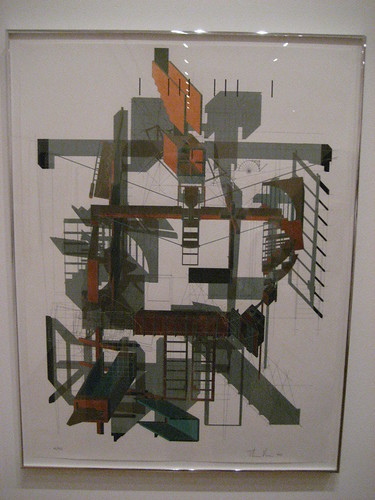 A box from the Mies van der Rohe Archive
A box from the Mies van der Rohe Archive
Am I allowed to like Gordon Bunshaft's Lever House more than Mies van der Rohe's/Philip Johnson's Seagram Building? I hope so, because in what was one of the most ridiculously beautiful New York days I've ever encountered, the Lever House just looked gorgeous, whereas the Seagram looked ominous and imposing. Don't get me wrong, I love Mies. I love the Seagram Building. But the Lever House is where it's at.
Which brings me to why exactly I was strolling around, admiring some mid-20th century American skyscraper modernism ... yesterday, the class that I am currently curating at Yale with the rest of the second-year MED's, our "contemporary architectural discourse colloquium", made an 11th-hour detour to New York.
Our first stop was
MoMA, where we had a private gallery tour with Head Architecture Curator
Barry Bergdoll. He took us into an exhibition which is in the process of being finished -- an exhibition showcasing MoMA's architecture collection just in time for the 75th anniversary of Alfred Barr's and Philip Johnson's seminal
Architecture Since 1922 show -- the famous 1932 show that was eventually called the
Modern Architecture show, aka
The International Style. Bergdoll gave a quick tour of the exhibit, which included some gems: Le Corbusier's drawings for the
Pavillion Suisse, Erik Gunnar Asplund's elevations and sections for the
Stockholm Public Library, Archigram's
Plug-In City, an early concept sketch of Hans Poelzig's
Grosses Schauspielhaus, Aldo Rossi's
Cemetery at San Cataldo, and others. For a history geek (like me), it was an amazing, humbling experience to see these, and other works that I know so well from books.
 Lecturing before a model of a space frame by R. Buckminster Fuller
Lecturing before a model of a space frame by R. Buckminster Fuller Bergdoll shows off some sketches Mies made for the sculpture in front of the Seagram's Building
Bergdoll shows off some sketches Mies made for the sculpture in front of the Seagram's Building
Bergdoll then took us to the archives, where we got a peek at drawings and documents from the Mies van der Rohe archive. It's interesting, because many of the vicissitudes of contemporary practice where visible there in the archive: drawings with mistakes, CD's authored by third parties, construction details drawn by office "flunkies." One person asked if the Mies archive separated personal and professional correspondence. Bergdoll, the consummate curator said, simply, "no." He implied that great damage has been done to important archives in the past (read:
The Fondation Le Corbusier) because of some irreparable post-hoc rationalizing by curators.
 An early drawing by Thom Mayne
An early drawing by Thom Mayne
But it was the subject of curating that kept us interested. Bergdoll mused on the role of the architectural curator in this day and age, raising some important questions. For example, how does one curate a CAD drawing or machine tool path? How does one categorize a prototype model spit out by a CNC mill or a plastic printer? It is a fascinating premise: the curator is the consummate historian, but must always keep an eye to the future, anticipating unforseen, plausible, yet important issues.
We then ended the day with a visit to the offices of
area/code. Started by Kevin Slavin, area/code is a company that specializes in urban-scale "big games." These are games like
Pacmanhattan, or
Crossroads that require players to navigate urban blocks via a phone application. Basically, it is touted as a new way to appreciate the city. The premise is certainly compelling, as it explores the idea of combining narrative and play as an additional way of negotiating urban spaces.







4 Comments
I too was struck by the Lever House, and most definately felt it more playful and, I guess, human scale.
the problem is, that everyone else on that street tried to throw in cheap green spandrels, etc. to try and get the same look... its disgusting. I think it's a shame, that corner could have been really outstanding.
and the sunny day probably had a lot to do with it too... with the stainless steel and all. i also went on a brilliant day.
it's the same with the inland steel building in chicago. when it's overcast, it gets really dull and dirty lookin...
All the CAD files can still be stored under different categories, but the primary 'by date' filing keeps the overall historical record.
Image files are also stored first under their date of creation.
This system is in emulation of how computers themselves "curate" files/work.
that must of been fun going through those pockets of architecture, and having it curated too...great stuff
more?
Block this user
Are you sure you want to block this user and hide all related comments throughout the site?
Archinect
This is your first comment on Archinect. Your comment will be visible once approved.